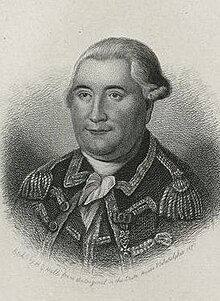At the French Ministry in Philadelphia
Here’s a story I’ve been intermittently digging into since 2013, when a chance tweet about it from the author William Hogeland intrigued me. That’s a long time ago, and it feels like even longer.
Albert Rémy de Meaux was born in Vitry-le-François, in the French province of Champagne, on 11 May 1753. In July 1769 he entered artillery school, and a year later became a lieutenant in the Auxonne Artillery.
In 1778, after the French government decided to help the new nation irk Great Britain, it sent guns and money; a diplomatic minister, Conrad Alexandre Gérard de Rayneval (1729–1790); and a naval fleet under Adm. Charles Henri Hector, count d’Estaing (1729–1794).
The next year, France upped its stake by sending a more prestigious minister, the chevalier de la Luzerne (1741–1791, shown here). And the year after that, it dispatched an Expédition Particulière—a special expedition containing a significant number of soldiers (by North American standards) under Gen. Rochambeau.
Lt. De Meaux was part of Rochambeau’s army and thus probably saw action at Yorktown at the end of 1781. He appears to have sustained some sort of wound or injury early the next year and needed to convalesce.
For that the lieutenant was given a berth in the large home that De la Luzerne had rented in the American capital of Philadelphia. The 2 Apr 1782 Philadelphia Packet reported, “This building stands alone, at a considerable distance from any other, at the western extremity of the city.” In her diary Elizabeth Drinker described it as located “up Chestnut St.”
On 27 March, during “a considerable shower of rain,” that house was struck by lighting—“in three different places,” said a detailed report in the Packet.
De la Luzerne had taken to sleeping in an iron bed. According to George Grieve, writing a couple of decades later, this was “by way of security from the bugs.” The lightning went through the bed and “set the curtains and bedcloaths on fire.”
Fortunately for the minister, he was away in Virginia consulting with the army. Rochambeau wrote to the French minister of war from Williamsburg on 14 April:
TOMORROW: “The electric matter appears to have scattered.”
(My thanks to Dr. Robert A. Selig for his help in identifying Lt. Albert Rémy de Meaux.)
Albert Rémy de Meaux was born in Vitry-le-François, in the French province of Champagne, on 11 May 1753. In July 1769 he entered artillery school, and a year later became a lieutenant in the Auxonne Artillery.
In 1778, after the French government decided to help the new nation irk Great Britain, it sent guns and money; a diplomatic minister, Conrad Alexandre Gérard de Rayneval (1729–1790); and a naval fleet under Adm. Charles Henri Hector, count d’Estaing (1729–1794).
The next year, France upped its stake by sending a more prestigious minister, the chevalier de la Luzerne (1741–1791, shown here). And the year after that, it dispatched an Expédition Particulière—a special expedition containing a significant number of soldiers (by North American standards) under Gen. Rochambeau.
Lt. De Meaux was part of Rochambeau’s army and thus probably saw action at Yorktown at the end of 1781. He appears to have sustained some sort of wound or injury early the next year and needed to convalesce.
For that the lieutenant was given a berth in the large home that De la Luzerne had rented in the American capital of Philadelphia. The 2 Apr 1782 Philadelphia Packet reported, “This building stands alone, at a considerable distance from any other, at the western extremity of the city.” In her diary Elizabeth Drinker described it as located “up Chestnut St.”
On 27 March, during “a considerable shower of rain,” that house was struck by lighting—“in three different places,” said a detailed report in the Packet.
De la Luzerne had taken to sleeping in an iron bed. According to George Grieve, writing a couple of decades later, this was “by way of security from the bugs.” The lightning went through the bed and “set the curtains and bedcloaths on fire.”
Fortunately for the minister, he was away in Virginia consulting with the army. Rochambeau wrote to the French minister of war from Williamsburg on 14 April:
It was lucky for him that M. de Luzerne has been paying us a visit. Had he remained in Philadelphia it is probable he would have been killed by the lightning flash which fell upon his house, where, as a result, his bed and everything else was destroyed by fire.Not everything about the Philadelphia house was destroyed, but a great many things were badly hurt. And that included the unlucky Lt. De Meaux.
TOMORROW: “The electric matter appears to have scattered.”
(My thanks to Dr. Robert A. Selig for his help in identifying Lt. Albert Rémy de Meaux.)


No comments:
Post a Comment